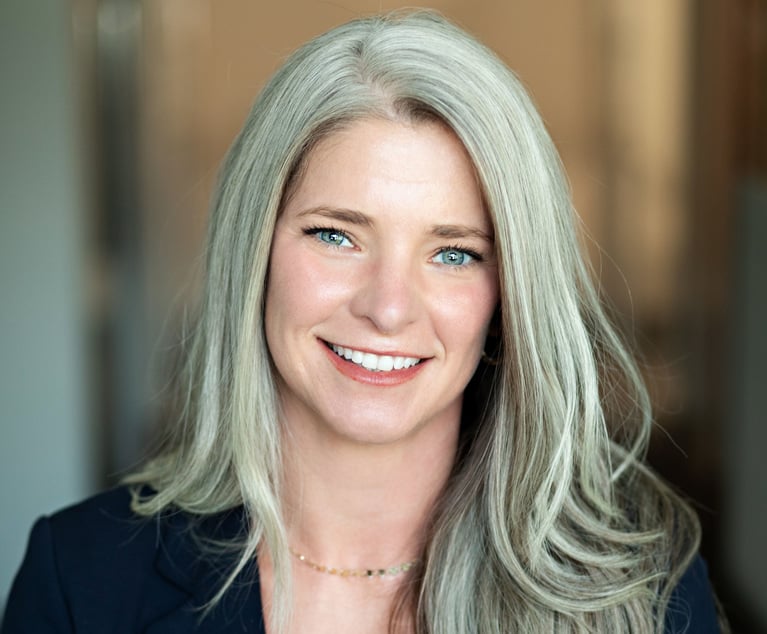Columbia Law takes an innovative approach to mentoring
Law school combines traditional mentoring models for a fresh take on student development
March 26, 2012 at 08:00 PM
6 minute read
It's never too soon to find a mentor. Found nearly everywhere throughout the legal world, mentoring programs are instrumental to teaching lawyers the skills they need to not only effectively do their jobs, but also learn how best to navigate the nuances of their careers. While both law firms and in-house legal departments recognize the importance of having formal and informal mentoring programs for their attorneys, law schools also see the importance of grooming students, and are starting the process early in the first year.
Columbia Law School believes that legal education is difficult to navigate, and is not necessarily intuitive for many new students. Because of this, Columbia has established a hybrid group/peer mentoring program where 80 second- and third-year students serve as mentors to first-year students. The 2L and 3L mentors go through a training program, receive a handbook and have regular communication with the administration in order to prepare them for work with the 1L mentees. The first-year students are then divided into groups of 15 people, and each group is assigned three mentors.
“Having someone who's been through it very recently and can roadmap for you, help share perspective and prioritize—all of those pieces can be extremely helpful to a first-year law student,” says Dean of Students Michelle Greenberg-Kobrin. “When they start, many law students spend most of their time in 1L-only classes, so the mentoring program helps them develop relationships with second- and third-year students, helps to build community across the classes, and makes the community stronger and more unified.”
First-year students have a series of set times to meet with their peer mentors throughout year at important moments when Greenberg-Kobrin says they really should be engaging with their community—at orientation, after the first exam a few weeks into the semester and prior to studying for final exams. At these times, students receive instruction on how to map their school year, reflection tips to help remain engaged in the coursework, as well as exam and study techniques. The mentors also are asked to arrange activities for their group once or twice throughout the semester, such as going out in the city or to a movie, that the administration helps subsidize.
This program model, Greenberg-Kobrin says, has really made a difference for the students.
“We think it's solved two of the main problems we see in mentoring programs,” she says. “The typical mentoring program usually involves a new lawyer being assigned to a more senior lawyer, and it's typically a one-on-one relationship with the expectation that you'll get together once a month or when they have time.”
While Columbia's mentoring program has been in place for about three years, this particular iteration is the result of many revisions and significant feedback from earlier participants. After listening to the previous groups of peer mentors and mentees, the administration decided that the notion of a micro-community that was big enough to have some diversity, but small enough to feel intimate, was something that could work. And the extra refinement is paying dividends.
“It's hard to hit on a formula that works well,” Greenberg-Kobrin says. “I think this program is unique to Columbia at this point because we've spent a lot of time thinking about what might work.”
It's never too soon to find a mentor. Found nearly everywhere throughout the legal world, mentoring programs are instrumental to teaching lawyers the skills they need to not only effectively do their jobs, but also learn how best to navigate the nuances of their careers. While both law firms and in-house legal departments recognize the importance of having formal and informal mentoring programs for their attorneys, law schools also see the importance of grooming students, and are starting the process early in the first year.
Columbia Law School believes that legal education is difficult to navigate, and is not necessarily intuitive for many new students. Because of this, Columbia has established a hybrid group/peer mentoring program where 80 second- and third-year students serve as mentors to first-year students. The 2L and 3L mentors go through a training program, receive a handbook and have regular communication with the administration in order to prepare them for work with the 1L mentees. The first-year students are then divided into groups of 15 people, and each group is assigned three mentors.
“Having someone who's been through it very recently and can roadmap for you, help share perspective and prioritize—all of those pieces can be extremely helpful to a first-year law student,” says Dean of Students Michelle Greenberg-Kobrin. “When they start, many law students spend most of their time in 1L-only classes, so the mentoring program helps them develop relationships with second- and third-year students, helps to build community across the classes, and makes the community stronger and more unified.”
First-year students have a series of set times to meet with their peer mentors throughout year at important moments when Greenberg-Kobrin says they really should be engaging with their community—at orientation, after the first exam a few weeks into the semester and prior to studying for final exams. At these times, students receive instruction on how to map their school year, reflection tips to help remain engaged in the coursework, as well as exam and study techniques. The mentors also are asked to arrange activities for their group once or twice throughout the semester, such as going out in the city or to a movie, that the administration helps subsidize.
This program model, Greenberg-Kobrin says, has really made a difference for the students.
“We think it's solved two of the main problems we see in mentoring programs,” she says. “The typical mentoring program usually involves a new lawyer being assigned to a more senior lawyer, and it's typically a one-on-one relationship with the expectation that you'll get together once a month or when they have time.”
While Columbia's mentoring program has been in place for about three years, this particular iteration is the result of many revisions and significant feedback from earlier participants. After listening to the previous groups of peer mentors and mentees, the administration decided that the notion of a micro-community that was big enough to have some diversity, but small enough to feel intimate, was something that could work. And the extra refinement is paying dividends.
“It's hard to hit on a formula that works well,” Greenberg-Kobrin says. “I think this program is unique to Columbia at this point because we've spent a lot of time thinking about what might work.”
This content has been archived. It is available through our partners, LexisNexis® and Bloomberg Law.
To view this content, please continue to their sites.
Not a Lexis Subscriber?
Subscribe Now
Not a Bloomberg Law Subscriber?
Subscribe Now
NOT FOR REPRINT
© 2024 ALM Global, LLC, All Rights Reserved. Request academic re-use from www.copyright.com. All other uses, submit a request to [email protected]. For more information visit Asset & Logo Licensing.
You Might Like
View All
'The Show Must Go On': Solo-GC-of-Year Kevin Colby Pulls Off Perpetual Juggling Act

How Amy Harris Leverages Diversity to Give UMB Financial a Competitive Edge
5 minute read
How Marsh McLennan's Small But Mighty Legal Innovation Team Builds Solutions That Bring Joy

Immigration Under the Trump Administration: Five Things to Expect in the First 90 Days
8 minute readTrending Stories
- 1Gibson Dunn Sued By Crypto Client After Lateral Hire Causes Conflict of Interest
- 2Trump's Solicitor General Expected to 'Flip' Prelogar's Positions at Supreme Court
- 3Pharmacy Lawyers See Promise in NY Regulator's Curbs on PBM Industry
- 4Outgoing USPTO Director Kathi Vidal: ‘We All Want the Country to Be in a Better Place’
- 5Supreme Court Will Review Constitutionality Of FCC's Universal Service Fund
Who Got The Work
Michael G. Bongiorno, Andrew Scott Dulberg and Elizabeth E. Driscoll from Wilmer Cutler Pickering Hale and Dorr have stepped in to represent Symbotic Inc., an A.I.-enabled technology platform that focuses on increasing supply chain efficiency, and other defendants in a pending shareholder derivative lawsuit. The case, filed Oct. 2 in Massachusetts District Court by the Brown Law Firm on behalf of Stephen Austen, accuses certain officers and directors of misleading investors in regard to Symbotic's potential for margin growth by failing to disclose that the company was not equipped to timely deploy its systems or manage expenses through project delays. The case, assigned to U.S. District Judge Nathaniel M. Gorton, is 1:24-cv-12522, Austen v. Cohen et al.
Who Got The Work
Edmund Polubinski and Marie Killmond of Davis Polk & Wardwell have entered appearances for data platform software development company MongoDB and other defendants in a pending shareholder derivative lawsuit. The action, filed Oct. 7 in New York Southern District Court by the Brown Law Firm, accuses the company's directors and/or officers of falsely expressing confidence in the company’s restructuring of its sales incentive plan and downplaying the severity of decreases in its upfront commitments. The case is 1:24-cv-07594, Roy v. Ittycheria et al.
Who Got The Work
Amy O. Bruchs and Kurt F. Ellison of Michael Best & Friedrich have entered appearances for Epic Systems Corp. in a pending employment discrimination lawsuit. The suit was filed Sept. 7 in Wisconsin Western District Court by Levine Eisberner LLC and Siri & Glimstad on behalf of a project manager who claims that he was wrongfully terminated after applying for a religious exemption to the defendant's COVID-19 vaccine mandate. The case, assigned to U.S. Magistrate Judge Anita Marie Boor, is 3:24-cv-00630, Secker, Nathan v. Epic Systems Corporation.
Who Got The Work
David X. Sullivan, Thomas J. Finn and Gregory A. Hall from McCarter & English have entered appearances for Sunrun Installation Services in a pending civil rights lawsuit. The complaint was filed Sept. 4 in Connecticut District Court by attorney Robert M. Berke on behalf of former employee George Edward Steins, who was arrested and charged with employing an unregistered home improvement salesperson. The complaint alleges that had Sunrun informed the Connecticut Department of Consumer Protection that the plaintiff's employment had ended in 2017 and that he no longer held Sunrun's home improvement contractor license, he would not have been hit with charges, which were dismissed in May 2024. The case, assigned to U.S. District Judge Jeffrey A. Meyer, is 3:24-cv-01423, Steins v. Sunrun, Inc. et al.
Who Got The Work
Greenberg Traurig shareholder Joshua L. Raskin has entered an appearance for boohoo.com UK Ltd. in a pending patent infringement lawsuit. The suit, filed Sept. 3 in Texas Eastern District Court by Rozier Hardt McDonough on behalf of Alto Dynamics, asserts five patents related to an online shopping platform. The case, assigned to U.S. District Judge Rodney Gilstrap, is 2:24-cv-00719, Alto Dynamics, LLC v. boohoo.com UK Limited.
Featured Firms
Law Offices of Gary Martin Hays & Associates, P.C.
(470) 294-1674
Law Offices of Mark E. Salomone
(857) 444-6468
Smith & Hassler
(713) 739-1250






